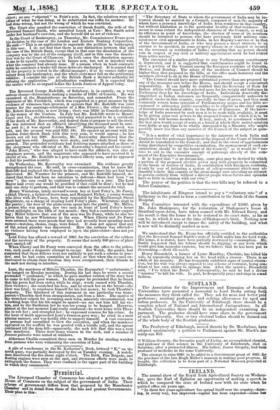Vrottiarial.
The Liverpool Chamber oi Commerce has adopted a petition to the House of Commons on the subject of the government of India. Their scheme of government differs from that proposed by the Manchester Cluunher and in detail from those of the late and present Governments. Their plan is this: "The Secretary of State to whom the government of India may be in. trusted should be assisted by a Council, composed of men the majority whom have a personal knowledge of India from residence in that coun but without limitation as to the particular locality of that residence. To secure to some extent the independent character of the Council, as well as its efficiency in point of knowledge, the election of some of its membess should be intrusted to persons who have previously held military oom. missions or civil appointments in India, in her Majesty's service or in that of the Government of India, or who may possess a direct interest, to an amount to be specified, in some property situate in or charged or secured on the revenues or territories of India; excepting that no person should vote in respect of any civil or military appointment until he had retired from active service."
The extension of a similar privilege to any Parliamentary constituency is deprecated, and it is suggested that constituencies might be found to elect a portion of the Council among the European residents of Calcutta, Madras, and Bombay. The salary of the members of Council should be higher than that proposed in the bills, or the office made honorary and the members allowed to sit in the House of Commons.
"The Council should have more substantial powers than are proposed by any of the measures now before the House, and should accept a concurrent responsibility. It can hardly be doubted that the Secretary of State for Indian Affairs will usually be selected more for his weight and influence in Parliament than for his knowledge of India. Individuals deservedly dis- tinguished as Indian statesmen are frequently comparatively unknown to political circles in this country, especially in time of peace, and they most commonly return home ignorant of Parliamentary usages and too little ac- customed to addressing public assemblies to be eligible as the chief organs of Government on Indian affairs in the House of Commons. If the know- ledge of India possessed by such men is to be made fully available, it must be by giving some real powers to the proposed Council of which it is to be hoped they will become members. It may, indeed, be questioned whether the best men would accerit of seats at a board at which their united opinions were liable at any time to be wholly disregarded by a Minister who might possibly know less than any member of the Council of the subject in ques- tion.
"It is a matter of vital importance to the interests of both India and England that the patronage hitherto at the disposal of the Court of Directors should be transferred to the Council ; and that in the event of appointments being distributed by competitive examination, the management of such ex- aminations should be in the hands of the Council," as it would be "un- wise to add to the excessive amount of patronage already at the com- mand of the Executive Government."
It is hoped that "at no distant day, some plan may be devised by which a portion of the proposed elective power may with propriety be committed. to the hands of natives of India, in combination with European residents, if only by way of initiating a system of self-government which may ul•• timately relieve this country of the great danger ever attending an attempt to govern entirely from without a distant people whose habits and opinions have so little in common with our own."
The prayer of the petition is that the two bills may be referred to a Select Committee.
The inhabitants of Ringmer intend to pay a "voluntary rate" of a halfpenny in the pound to form a contribution to the funds of the Sussex Hospital.
The Committee intrusted with the expenditure of 2500/. given by Mr. John Shakspeare, for the restoration of Shakspeare's house at Stratford-upon-Avon, have taken counsel with Mr. Edward Barry, and the result is that the house is to be restored to its exact state, as far as can be, in which it was at the time of Shakspeare's birth. Nothing new will be introduced except to insure the safety of the building, and what is new will be distinctly marked as new.
We understand that Dr. Evans has officially certified to the authorities
• that the Reverend Samuel Smith's state of health unfits him for hard work. His lungs, it is stated, have been partially destroyed by consumption. Kr. Smith requested that his labour should be digging, or any work which would give him muscular exercise, but we believe that he has been put to shoemaking.—Bath Chronicle.
Henry Bloomfield, a farmer of Lyme Handley, Cheshire, has killed his wife, by repeatedly striking her on the head with a cleaver. There is no doubt of his insanity. He has frequently exhibited signs of mental aberra- tion, but his wife was always opposed to any scheme of restraint, being con- fident of her own ability to manage him. After the murder, Bloomfield said, "I've killed the Devil." Subsequently, he said he had a divine " mission " to kill his wife. In gaol, he frequently prays and sings in a mad fashion.


































 Previous page
Previous page